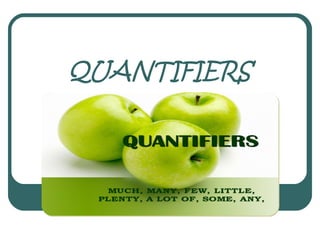
Quantifiers
- 1. QUANTIFIERS
- 2. Qué son los cuantificadores? Los cuantificadores indican la cantidad de un nombre. Son repuestas a la pregunta "¿Cuántos?“ Definen a un nombre y siempre están situados delante del nombre.
- 3. Many Significado: Mucho (siempre con nombres CONTABLES) Uso: Expresa la idea de gran cantidad. Es utilizado sobretodo en frases negativas e interrogativas con el nombre contable en plural. Ejemplos: There are not many tourists. How many cats do you have? Se puede usar "many" en frases afirmativas, aunque no es muy común. Normalmente, usamos otros cuantificadores como "a lot." We have many friends.
- 4. Much Significado: Mucho (siempre con nombres INCONTABLES) Uso: Expresa la idea de gran cantidad y es utilizado sobretodo en frases negativas e interrogativas. Ejemplos: There is not much time. How much money does he have? Se puede usar "much" en frases afirmativas, aunque sería más formal y no es tan común. Normalmente utilizamos “a lot” We have much to do!
- 5. A lot of/Lots of Significado: Mucho Uso: Expresan idea de gran cantidad. Se puede usar con nombres o sustantivos contables e incontables. A diferencia de "many" y "much", no las usamos en frases interrogativas. En general, "lots of" es más informal. Ejemplos: He has a lot of books. I have lots of money.
- 6. Resumen CONTABLES INCONTABLES O. AFIRMATIVAS A lot O. NEGATIVAS Many Much O. INTERROGATIVAS Many Much
- 7. Little/A little Significado: Poco/s Uso: Expresan una cantidad pequeña y se usan sólo con nombres incontables. La decisión de usar "little" o "a little" refleja una opinión sobre la cantidad. Si usas "a little", significa una opinión positiva sobre la cantidad y si usas "little" implica una opinión negativa. Ejemplos: We have little time.
- 8. Few/A few Significado: Poco/s Uso: Expresan un número pequeño. "A few" puede indicar un número suficiente. Se usan sólo con nombres contables. La decisión a usar "few" o "a few" refleja la opinión sobre la cantidad expresada. "Few" describe la cantidad de forma negativa y "a few" la describe de forma positiva. Ejemplos: Do you have a few dollars? There are few tourists here today.
- 9. SOME Significado: Algunos, unos Uso: Se utiliza tanto para los nombres o sustantivos incontables como para los nombres o sustantivos contables en plural. Se usa en frases afirmativas. Significa una cantidad indefinida, pero limitada. Ejemplos: She has some apples.7 There is some milk in the kitchen
- 10. ANY Significado: Algunos, ninguno Uso: Se utiliza en los mismos contextos que "some," pero en frases negativas o interrogativas. Ejemplos: I do not have any cats. He does not have any money. Are there any changes? Is there any milk?
- 11. No, None Significado: No, ninguno Uso: A diferencia de la partícula "no," "none" se puede utilizar sin ir acompañado de un nombre, contable o incontable. Por tanto acostumbra a ir a final de frase y como única respuesta a una pregunta que haga referencia a cantidades. Ejemplos: How many pencils are there? None. : I have no money. (No tengo dinero.)